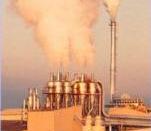Describe and explain how the use of Fossil fuels may affect the environment and discuss measures, which could be taken to reduce the harmful consequences Fossil fuels include gasoline, oil, coal, or natural gas. Whenever we burn them, more pollutant gases are emitted into the atmosphere. They are burned to run cars and trucks, heat homes and business and power factories and are responsible for about 98% of U.S carbon dioxide emissions, 24% of methane emissions and 18% of nitrous oxide emissions. Because of the harmful effects of these pollutant gases, produced when fossil fuels are burnt, they pose a major threat to the environment.
Almost all air pollutants are the result of fossil fuel combustion, either in the home, by industries or the internal combustion engine. Smoke is tiny particles of carbon suspended in the air, produced as a result of burning coal and oil. While smoke remains in the air, it can reduce the light intensity at ground level; hence reduce the overall rate of photosynthesis.
Deposits of smoke, or more particularly, soot and ash, may coat plant leaves directly reducing photosynthesis by preventing light penetration or even by clogging stomatal openings.
The pollutants involved in acid rain are sulphur dioxide, oxides of nitrogen, ozone and various volatile organic vapours given off from gasoline stations. Fossil fuels contain between 1% and 4% sulphur and consequently around 30 million tonnes of sulphur dioxide is emitted from the chimneys of Europe each year. It's effect in high concentrations, are harmful to plants in that it reduces growth, especially in barley, wheat and lettuce and others such as lichens may be killed. Sulphur dioxide (SO2) dissolves in water forming sulphurous acid (H2SO3). This is then converted to sulphur trioxide (SO3) then to sulphuric acid (H2SO4). Acid rain is harmful since it...


